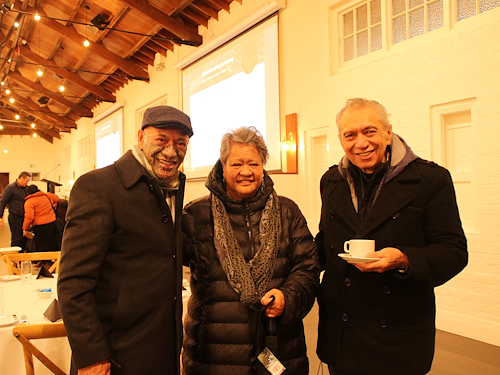Last updated: Monday, 29 April 2024 | Rāhina, 29 Paengawhāwhā, 2024
What's on this page?
Te Puni Kōkiri has allocated its available funding for supporting repairs to whānau-owned homes for this financial year (up to end of June 2024). See here for more information.
What we do

Te Puni Kōkiri provides grant funding that contributes to:
- Improving the basic quality of Māori housing stock in Aotearoa.
- Reducing the number of whānau Māori living in unsafe or substandard housing situations.
- Building the capability of whānau homeowners to repair and maintain their homes.
How we do it
Te Puni Kōkiri fund rōpū to coordinate repair programmes in communities. The rōpū must be a legal entity. Rōpū are expected to manage the repair programme, including accessing other Government funding to improve housing quality, such as EECA’s Warmer Kiwi Homes programme which offers insulation and heater grants to low-income homeowners.

The eligible whānau that the rōpū support to repair their homes must:
- Be whānau living in substandard housing situations.
- Be the owner/occupier of the house or living in a whānau-owned house (ie, not in a private rental situation outside of the whānau).
- Be eligible for a community services card.
- Not able to finance the full cost of the repairs themselves (or with the help of whānau members).
- There must be a vulnerable person(s) living in the whare (such as kaumātua, tamariki, pakeke with chronic illnesses/disabilities)
- Have provided all appropriate access and approvals for assessments and repairs to take place.
We prioritise funding to support homes on whenua Māori. On Māori freehold land, there are fewer options for whānau to leverage off the value of their homes and to finance their own repairs.
The investment in repairing homes on Māori freehold land continues to benefit future generations on whānau Māori because of the restrictions around the sale of Māori freehold land.
What can the grant be used for?

- Independent Building Condition Assessments: The costs of procuring independent building condition reports, engineering reports to confirm the repairs components, and any costs associated with procuring formal quotes for works to be completed.
- Repairs: Repairs to bring whānau homes up to warm, dry and secure standards, specifically repairs to defects that present a serious risk to health, life, or safety. Prioritisation is given to homes owned and occupied by low-income whanau with vulnerable persons in the household (children, kaumātua, special health and social service needs), and repairs enabling whānau to move into a vacant house.
- Home maintenance workshops: The rōpū may provide workshops to upskill whānau in the basic maintenance of their whare.
- Repair and maintenance plans: The whānau may require support to help them plan for repairs and maintenance after these funded repairs have been completed. Following the completion of the repairs whānau are asked to plan for the ongoing maintenance of their whare, including undertaking maintenance that they are capable of doing and engaging others to undertake other work.
- Project administration and project management: A project administration fee can be charged as part of the grant to allow rōpū to pay for the coordination costs of organising with whānau and /or contractors to carry out repairs.
Repairs partners must also
- coordinate access to complementary funding from EECA for Warmer Kiwi Homes and MBIE for the Energy Efficiency Fund wherever applicable.
- have processes for whānau agreement to scope of repairs, communication with whānau, and complaints management.
- prioritise social procurement wherever possible.
- provide case studies demonstrating the impacts for whānau, and other outcomes and benefits realised from the investment in repairs, such as wellbeing, employment, and education.
Need more info, or want to apply for funding?
Click here to register a housing enquiry with a regional office near you.
Demand across the rohe exceeds the amount of funding Te Puni Kōkiri has available. We cannot fund every proposal that meets our criteria, as much as we would like to.
For more information on what funding is available and what has been delivered go here.
Related News and Stories
Read our latest news and stories for this kaupapa.

Māori Housing: Urban development in Tāmaki
Whenua where an urban Māori housing development will soon sit was blessed and had the sod turned recently in Mt Wellington, Tāmaki Makaurau.

Māori Housing: Iwi prototypes underway
Over the past year, Te Puni Kōkiri and Te Tūāpapa Kura Kāinga have been working with a number of iwi groups to test, develop, and implement new Māori housing models.

Māori housing: Whānau enjoying papakāinga life in Tauranga Moana
On a sloped section surrounded by orchards, overlooking Rangataua Bay in Tauranga, sit nine new whare all part of the Ranginui 12 Trust papakāinga.

Māori Housing: Large papakāinga underway in Motueka
As dawn broke on Monday morning, karakia rang out around Te Āwhina Marae in Motueka.

Papakāinga projects underway in Reporoa
The Government is supporting a new papakāinga development in the rural community of Reporoa.

Progressive Home Ownership helps Taranaki whānau buy first home
Last year, Vicki and Dean Wall bought their first home in Ōpunake, a whare they had been renting for the past 13 years.